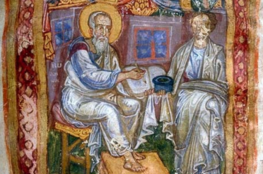Here are a few more words, penned by Eastern Orthodox Christians, for “Ancient Faith Acton” to digest.
[T]he structure of the state is secondary to the spirit of human relations… The strength or weakness of a society depends more on the level of spiritual life than on its level of industrialization. Neither a market economy nor even general abundance constitutes the crowning achievement of human life.
– Alexander Solzhenitsyn, Rebuilding Russia, pg. 49
The turn introduced by the Renaissance evidently was inevitable historically. The Middle Ages had come to a natural end by exhaustion, becoming an intolerable despotic repression of man’s physical nature in favor of the spiritual one. Then, however, we turned our backs upon the Spirit and embraced all that is material with excessive and unwarranted zeal. This new way of thinking, which had imposed on us its guidance, did not admit the existence of intrinsic evil in man nor did it see any higher task than the attainment of happiness on earth. It based modern Western civilization on the dangerous trend to worship man and his material needs. Everything beyond physical well-being and accumulation of material goods, all other human requirements and characteristics of a subtler and higher nature, were left outside the area of attention of state and social systems, as if human life did not have any superior sense. That provided access for evil, of which in our days there is a free and constant flow. Merely freedom does not in the least solve all the problems of human life and it even adds a number of new ones.
– Alexander Solzhenitsyn, 1978 Harvard Address
The attitude of Orthodox Christians to property should be based on the gospel’s principle of love of one’s neighbor, expressed in the words of the Savior: «A new commandment I give unto you, That ye love one another» (Jn. 13:34). This commandment is the basis of Christian moral behavior. For Christians and the Church believes for other people as well, it should be an imperative in regulating interpersonal relationships, including property relations.
According to the teaching of the Church, people receive all the earthly blessings from God who is the One who holds the absolute right to possess them. The Savior repeatedly points to the relative nature of the right to property in His parables on a vineyard let out to be used (Mk. 12:1-9), on talents distributed among many (Mt. 25:14-30) and on an estate handed over for temporary management (Lk. 16:1-13). Expressing the idea inherent to the Church that God is the absolute owner of everything, St. Basil the Great asks: «Tell me, what do you have that is yours? Where from did you take it and bring to life?» The sinful attitude to property manifested in the conscious rejection of this spiritual principle generates division and alienation among people.
– The Basis of the Social Concept of the Russian Orthodox Church, ch. VII(1)



